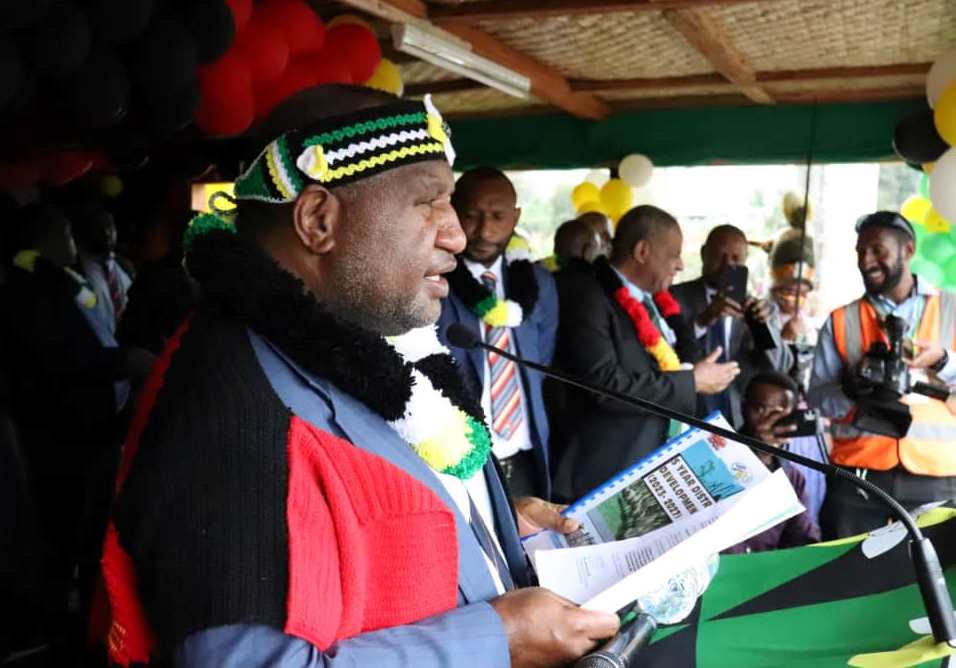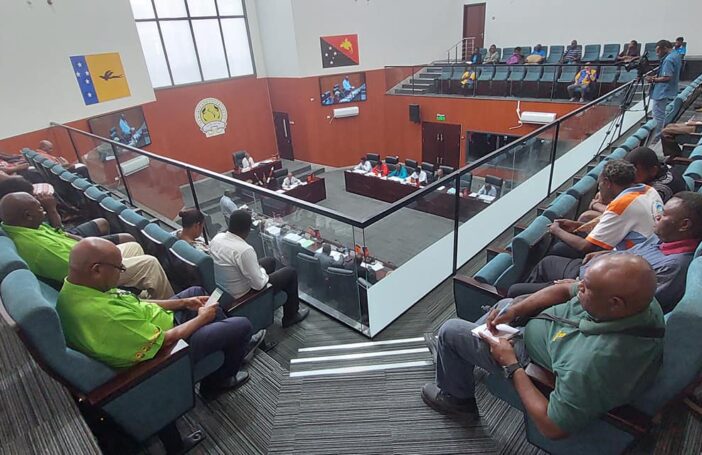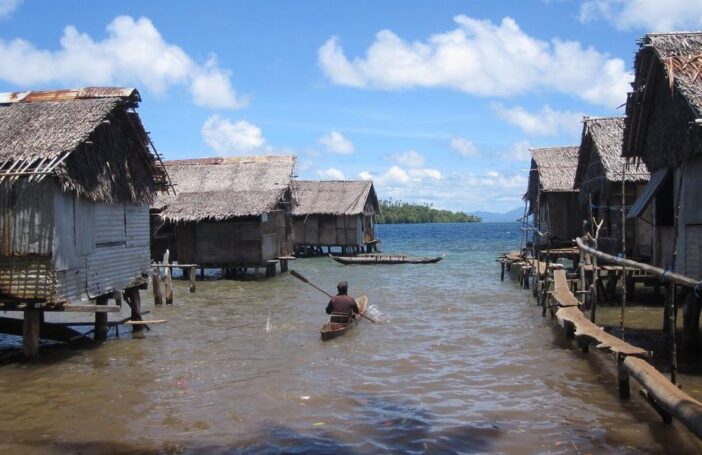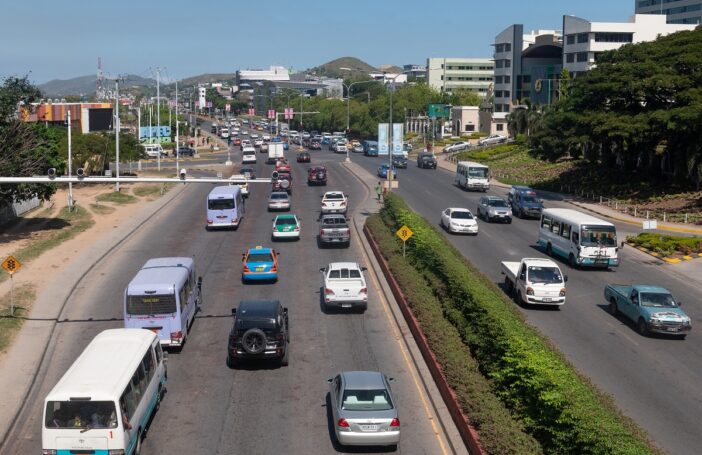Papua New Guinea Prime Minister James Marape announced during the 2022 festive season that the annual allocation of electoral funding to each member of parliament (MP) will double in 2023.
It has largely gone unnoticed that the 2023 budget brought down in late November included this doubling. For some time, MPs have already been budgeted K10 million a year each through the District Services Improvement Program (DSIP) for “open” (district) MPs and through the Provincial Services Improvement Program (PSIP) for provincial governors.
The Treasurer’s budget speech indicated that in 2023 an additional K960 million was being allocated for the new District Infrastructure Program (DIP) and K220 million for the Provincial Infrastructure Program (PIP). Presumably this will be distributed at the rate of K10 million per MP, though according to Marape the allocation for provinces had not been decided on.
The actual budget allocation for MP funds beyond DSIP/PSIP in this year’s budget is slightly less, at K1 billion rather than the K1.2 billion in the Treasurer’s speech. In any case, there is now K1.18 billion in DSIP/PSIP plus another K1-1.2 billion in DIP/PIP, for a total of K2.2-2.4 billion to be directly controlled by MPs in 2023.
Either way, this is a massive jump.
The graph below provides historical figures of MP funds to the districts (not provincial governors) in PNG, in nominal terms, in constant prices and as a share of total expenditure. 2023 is set to break all records for MP funds, except for the share of expenditure, where 8% was also reached in the boom year of 2008, but not sustained.

The intention of this and past governments to get spending to the districts is commendable. If effectively spent, the funds could make a real difference to rural PNG where 85% of the country’s population lives. There are many forgotten districts with dilapidated public infrastructure and non-existent basic government services (the Paiela-Hewa district, for example) that urgently require the national government’s attention and capital investment. However, while politicians are skeptical of the bureaucracy’s ability to deliver, and for good reason, MP funding is problematic for a number of well-known reasons.
First, giving large sums of discretionary funding to MPs has diluted their role as legislators. As the heads of the district development authorities which spend the district funds, the MPs have essentially become project managers, usurping the functions of public servants in the districts to manage the devolved public funding.
Second, the MP funds circumvent provincial governments, give rise to conflicts between provincial and district MPs, and mean that PNG is over-governed with vehicles of government at four levels: national, provincial, district and local.
Third, MP funding politicises government service delivery. Having MPs responsible for roads and schools makes it more likely that roads will be dug up and schools burnt down during an election campaign.
Fourth, although the proper use of district funds could transform the lives of rural and remote populations, their actual use depends primarily on the goodwill and competence of the MPs. There is much evidence of incomplete and poor-standard DSIP-funded projects in districts. There have also been visible successes in some districts where MPs have spent DSIPs properly to develop their districts. But these seem to be more the exception than the rule.
Fifth, the accountability of MP-controlled funding is low. The Auditor-General recommended in a 2014 report on DSIPs “better processes of accountability and application of penalties for non-compliance”. MPs are required to provide expenditure reports/acquittals to the Department of Implementation and Rural Development (DIRD). 40% of MPs have failed to acquit their 2020-22 SIP allocations, and DIRD has been allocated only 15% of funding required to monitor SIP spending acquittals in 2023. Further, the last audit in 2019 by the Auditor-General’s Office found that 70% of acquittals for 2013-16 electoral development funds were outstanding. Of the 30% received by DIRD, most were late, and showed significant mismatch between figures reported against original funding disbursed.
Sixth, MP funding biases expenditure towards projects and against recurrent funding. Recurrent expenditure through traditional, central departments has fallen in recent years, and MPs are poor at maintaining service delivery levels. Thus PNG has new schools and health clinics, built but not operating due to a shortage of staff. It is surely no coincidence that since 2013, which is when the MP funding was first increased to K10 million per year, PNG’s vaccination performance has plummeted to 38% from 85% in 2005 and is the worst in the world. Vaccinations, and so many critical areas of government spending, cannot be funded by projects. They require an increase in and focus on recurrent funding.
Regardless of the merits of MP funding per se, the decision to double MP funding raises further objections.
First, PNG simply cannot afford this increase in spending. Deficits and debt are at a record level, and no serious money is being put into the Sovereign Wealth Fund, despite the fact that it was legislated five years ago.
Second, how will the DIP differ from the DSIP and the PIP from the PSIP? Most DSIP/PSIP funds are in any case spent on infrastructure, the focus of the DIP/PIP.
Third, it would seem that MPs are already struggling to spend their DSIP/PSIP funds, judging from the growth in government cash holdings in banks. Can MPs effectively spend double the amount they are already being given?
Fourth, PNG is looking to the International Monetary Fund to lend it money, but the IMF has already called on PNG to “scale back” the DSIP and PSIP.
So why, given all these reasons not to, would the government decide to double MP funding in 2023?
Research has shown that the level of DSIP funding allocation to districts has increased in recent years when government revenue rose. This year the government forecasts revenue to grow by 20.8%.
MP funding has also been used by past governments, including the O’Neill government, to hold a coalition government together, especially by withholding these funds from the opposition MPs. PM Marape has not resorted to this tactic. He has been fair to both sides of the parliament. However, he knows that the 18-month grace period will be up at the end of 2023, and he will be at risk of being deposed thereafter through a vote of no confidence. Perhaps he thinks this doubling of MP funds will help shore up support for his leadership in 2024. It is certainly hard to explain the decision in any other way.






The PNG government has to have a different level of governmental arm, made up of by senior public servants.
They can solely be responsible for implementing the government’s decision.
Let the legislatures do their role as law makers.